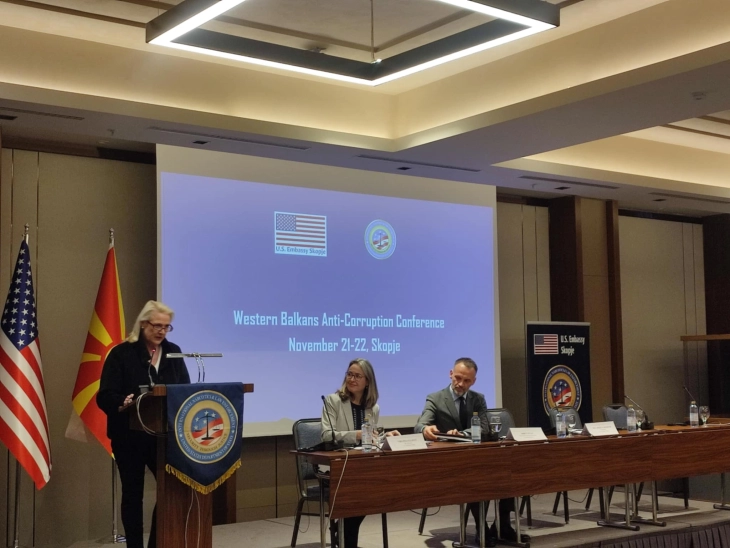Multi-sector cooperation in focus of first Western Balkans Anti-Corruption Conference
- The importance of multi-sector cooperation and the commitment to finding solutions in the fight against corruption, creating robust mechanisms for prevention and seeking accountability through systemic reforms and transparent institutions, were the focus of the opening event for the first Western Balkans Anti-Corruption Conference organized by the U.S. Embassy in Skopje, in cooperation with the Bureau of International Narcotics and Law Enforcement (INL).

Skopje, 21 November 2024 (MIA) – The importance of multi-sector cooperation and the commitment to finding solutions in the fight against corruption, creating robust mechanisms for prevention and seeking accountability through systemic reforms and transparent institutions, were the focus of the opening event for the first Western Balkans Anti-Corruption Conference organized by the U.S. Embassy in Skopje, in cooperation with the Bureau of International Narcotics and Law Enforcement (INL).
In her opening remarks, U.S. Ambassador to North Macedonia, Angela Aggeler, stressed the importance of multi-sector cooperation and the commitment of all participants in finding solutions to this critical problem.
"Seeing you all here shows that all sectors are involved, and it testifies to your commitment and search for a solution. It underscores the importance and urgency of the work ahead of us," said the Ambassador.
She added that those who choose to act and fight, and not give up, must be supported.
Through this conference, she noted, by bringing the "champions" together at one place, a network can be built that will fight corruption from a position of strength and trust.
"A new justice network is being launched in North Macedonia, connecting professionals from the criminal justice sector, who will share experience, encourage trust and support each other. We believe that this initiative will serve as a model in the region," she said.
The Ambassador encouraged participants to build knowledge and partnership during the conference and to share the experiences and lessons learned.

Deputy PM for Good Governance Policies, Arben Fetai, pointed out that corruption is a destructive force that undermines the system and threatens basic values. He stressed that North Macedonia's Government is committed to creating robust mechanisms to prevent corruption and demand accountability from corrupt persons, through systemic reforms and transparent institutions.
"The fight against corruption is not only a priority among other priorities, but it is our top priority, and our reform has already started. Our Government has started taking actions to achieve this goal. Our duty as the Government is to establish appropriate mechanisms to prevent corruption and seek accountability. This will be possible only through systemic reforms and through creating institutions that will work transparently for the benefit of the public," Fetai added.
According to him, this can be achieved by systematic audits in all public institutions, amending the Criminal Code to align the statute of limitations for acts related to corruption, in line with European standards.
"We will consult with stakeholders, with our international partners to provide the best solutions including improving our results. In terms of convictions in corruption-related cases, we will also focus on confiscation of ill-gotten gains, sending a clear message that corruption will not go unpunished, said the Deputy PM.
He pointed out that a strategy to fight against corruption is needed, which will be based on transparent and accountable institutions.
"We must create systems that will be resilient to external pressures, and institutions that will have to demand accountability from corrupt persons. This requires not only an independent judiciary, as I said before, but also a state administration that is well-trained and dedicated to the public interest," he noted.
He added that the fight against corruption is not only the responsibility of the Government, but it requires collective action and individual responsibility.
The two-day regional conference aims to foster a multi-sector regional network of “anti-corruption champions” — professionals from government, the judiciary, civil society, and business sectors dedicated to combating corruption.
This event brings together participants and speakers from North Macedonia, Albania, Bosnia and Herzegovina, Kosovo, Serbia and Montenegro.
Photo: MIA







